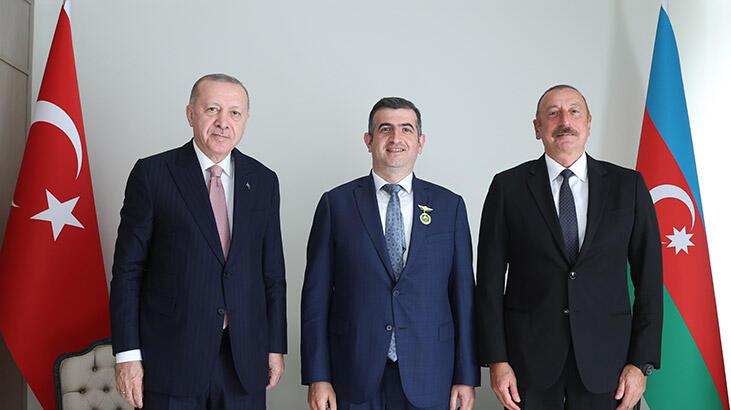Levent Kenez/Stockholm
The Turkish and Azerbaijani leaders met on Tuesday in a city that is emblematic of the Armenian-Azerbaijani conflict to sign a declaration announcing joint action in the field of defense.
Visiting the strategically important city of Shusha in the Nagorno-Karabakh region that both Armenia and Azerbaijan claim is historically their own, Turkish President Recep Tayyip Erdoğan and Azerbaijani President İlham Aliyev signed a new protocol called “The Shusha Declaration” on Azerbaijan’s national day, emphasizing the military cooperation between the two countries as well as Turkey’s commitment to Azerbaijan’s territorial integrity.
The most noteworthy clause of the declaration is undoubtedly the wording that refers to cooperation in the defense industry and mutual military assistance. According to the text signed by the two presidents, if a third state or states carry out attacks or threats against one of the two parties, the countries will jointly take appropriate initiatives and assist each other militarily for the purpose of preventing that threat or attack.
The Shusha Declaration in Turkish and Azeri:
Despite the text saying that “the military-political cooperation between the two parties in line with their interests is not against third states,” it is obviously a clear message to Armenia, which fell into instability following its defeat in the 44-day war against neighboring Azerbaijan in 2020. Calling Erdoğan and Aliyev’s visit to Shusha provocative, Armenia’s Foreign Ministry claimed in a statement on Tuesday that it would harm international efforts to establish stability in the region.
Another point that attracts attention is that the two countries have reached an agreement for the production of military equipment that is currently not available to one of them. The Azerbaijani press reported that production of the Turkish drones which played an enormous role in the victory in the recent war will begin in Azerbaijan in the coming months.
Meanwhile, before the signing ceremony President Aliyev bestowed the Garabagh Order, created on the occasion of the victory in the 2020 Second Nagorno-Karabakh War, on Haluk Bayraktar, CEO of Baykar Makina, which produces the Bayraktar TB2 military drones used by the Azerbaijani army. Aliyev previously gave the same order to Erdoğan’s son-in-law Selçuk Bayraktar, chief technology officer and a shareholder of Baykar Makina, in April, noting that Selçuk Bayraktar was at the forefront of the victory and praising Baykar drones “in the destruction of the enemy’s equipment during the liberation of Azerbaijani lands from occupation.”


Nordic Monitor previously reported that in 2018 leading Turkish defense contractor Aselsan signed an agreement with its Azerbaijani counterpart for the joint production of communications facilities. Similarly, Turkish Aerospace Industries (TAI) signed a cooperation protocol with the Azerbaijan National Academy of Sciences (AMEA) in September 2018 to join efforts in the fields of defense and aviation. The same year, the Turkish Mechanical and Chemical Industry Corporation (MKE) received a defense cooperation offer from Azerbaijan’s Ministry of the Defense Industry, the state-run Anadolu news agency reported. Moreover, Turkey’s Roketsan and Azerbaijani military-scientific enterprise Iglim have been working on developing a long-range missile system since 2009.
A noteworthy detail is that the protocol emphasizes Turkey’s contribution to the activities of the joint Turkish-Russian Center, which monitors the implementation of the Russian-brokered ceasefire in Nagorno-Karabakh and plays an important role in ensuring peace and stability in the region. However, many international observers claim that the joint center is not supposed to be functional, that in fact it is a “carrot” which aims to reduce Turkey’s influence in the region.
President Erdoğan also promised to open a Turkish consulate in the contested city of Shusha, a gesture welcomed by Azerbaijan. It is not difficult to guess that no other country will follow Turkey’s lead since they will not want any dispute with Armenia given the Armenian diaspora’s influence, particularly in the US and France.

It is no secret that an important issue on Erdogan’s agenda is that Turkish contractors close to him will be involved in lucrative post-war infrastructure projects. In a video that went viral on Tuesday Erdoğan, pointing out a construction area, asked Aliyev if “our Azeri brothers” would undertake the construction, and Aliyev replied by naming Turkish companies Cengiz and Kolin, which are owned by businessmen in Erdoğan’s inner circle. When Erdoğan said he didn’t know they were operating in Azerbaijan, Aliyev added, “They are everywhere.” Erdoğan, who pretended to be unaware of that fact, a few seconds before had said he just talked with [Mehmet] Cengiz, the owner of Cengiz Construction, and that Cengiz told him he was at the construction site.












